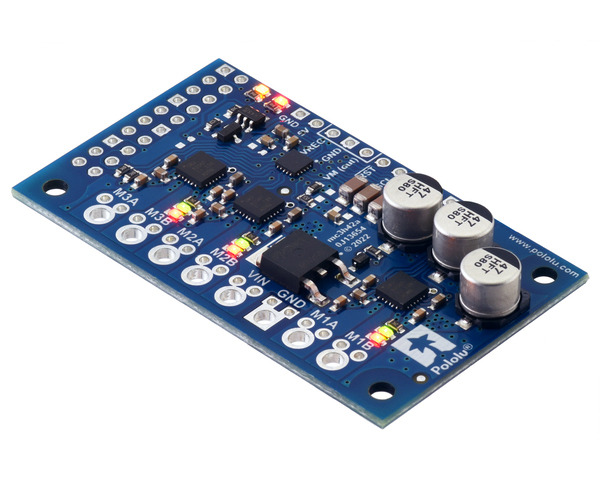

This is a merged information page for Item #5035.
View normal product page.
Pololu item #:
5035
Brand:
Pololu
Status:
Active and Preferred

The Motoron M3H256 Triple Motor Controller makes it easy to control DC motors from a Raspberry Pi (Model B+ or newer) through an I²C interface. Each module can independently control up to three motors, and multiple Motoron boards can be stacked on top of the same Raspberry Pi for projects that need to control even more motors. The M3H256 supports motor supply voltages from 4.5 V to 48 V and can deliver continuous output currents up to 2 A per motor. This version is just the motor controller by itself, without any connectors or mounting hardware included.
 Compare all products in Motoron M3H256 Triple Motor Controller for Raspberry Pi.
Compare all products in Motoron M3H256 Triple Motor Controller for Raspberry Pi.
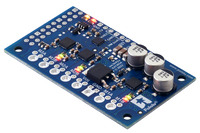 |
Motoron M3H256 Triple Motor Controller for Raspberry Pi (No Connectors or Standoffs). |
|---|
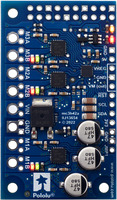 |
Motoron M3H256 Triple Motor Controller for Raspberry Pi, top view. |
|---|
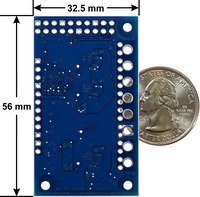 |
Motoron M3H256 Triple Motor Controller Kit for Raspberry Pi, bottom view with dimensions. |
|---|
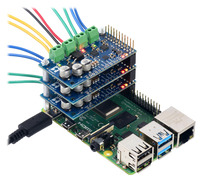 |
Three Motoron M3H256 controllers being controlled by a Raspberry Pi. |
|---|
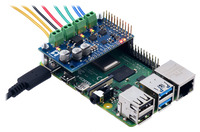 |
A Motoron M3H256 being controlled by a Raspberry Pi. |
|---|
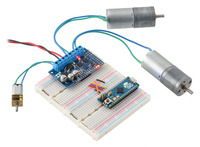 |
An Arduino Micro on a breadboard using a Motoron M3H256 to control three motors. |
|---|
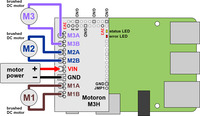 |
Using the Motoron M3H256 or M3H550 Triple Motor Controller with a Raspberry Pi. |
|---|
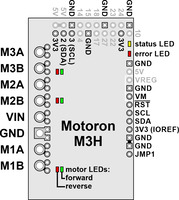 |
Motoron M3H256 or M3H550 Triple Motor Controller for Raspberry Pi pinout. |
|---|
The Motoron M3H256 add-on board makes it easy to control up to three bidirectional, brushed DC motors with a compatible Raspberry Pi (Model B+ or newer). It supports motor supply voltages from 4.5 V to 48 V and can deliver continuous output currents up to 2 A per motor. The M3H256 is designed to stack on top of a Raspberry Pi (Model B+ or newer), similar to a HAT (Hardware Attached on Top), and multiple Motoron controllers can be stacked on top of each other, allowing independent control of many motors. Unlike most of our motor drivers and motor driver expansion boards for Raspberry Pi, the Motoron does not require any PWM outputs on your Raspberry Pi. Instead, the Raspberry Pi communicates with the Motoron using I²C, so only two GPIO pins are needed regardless of how many Motorons you connect.
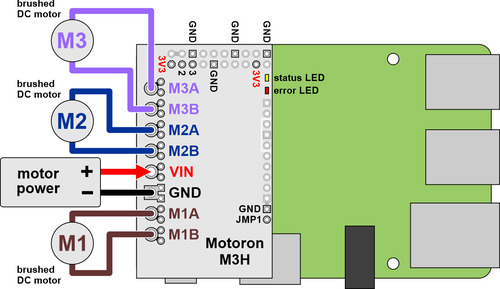 |
Three M3H256 versions are available to provide different options for the through-hole connectors:
For applications using an Arduino or compatible controller, consider the Motoron M3S256 instead (also available with different connector options).
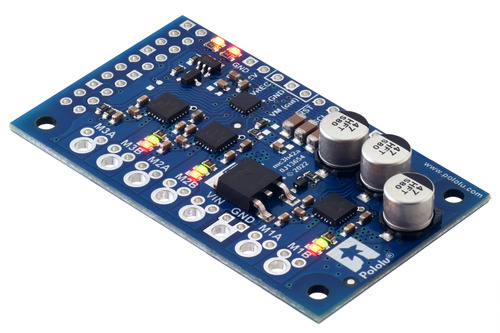 |
Motoron M3H256 Triple Motor Controller for Raspberry Pi (No Connectors or Standoffs). |
|---|
This Motoron version is just the assembled PCB module as shown above, with no connectors or mounting hardware included. This version is intended for those who mostly want to solder wires directly to the board or use different connectors from those included with other versions. We have a variety of connectors available separately.
|
|
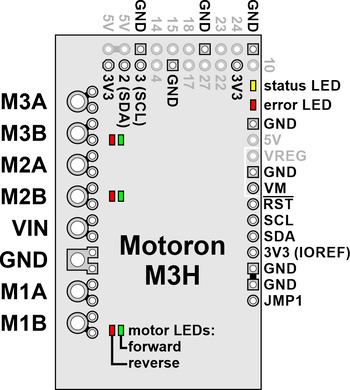 |
Motoron M3H256 or M3H550 Triple Motor Controller for Raspberry Pi pinout. |
|---|
The tables below list the members of the Motoron family and show the key differences among them. Each type is available in several versions to provide different options for the through-hole connectors: they can be purchased as an assembled product with connectors soldered in, as a kit with connectors included but not soldered in, or (for Arduino and Raspberry Pi expansions) as a standalone board without connectors.
| Motoron motor controllers micro versions |
|||||
 M3T453 w/JST connectors  M3T453 w/0.1″ headers |
 M1T550  M1U550 |
 M2T550  M2U550 |
 M1T256  M1U256 |
 M2T256  M2U256 |
|
|---|---|---|---|---|---|
| Control interface: | I²C | I²C or UART serial | |||
| Motor channels: | 3 (triple) | 1 (single) | 2 (dual) | 1 (single) | 2 (dual) |
| Minimum motor supply voltage: |
4.5 V | 1.8 V | 4.5 V | ||
| Absolute max motor supply voltage: |
44 V | 22 V | 48 V | ||
| Recommended max nominal battery voltage: |
32 V | 16 V | 36 V | ||
| Max continuous current per channel: |
0.8 A | 1.8 A | 1.6 A | 2.2 A | 1.8 A |
| Logic voltage range: | 3.0 V to 5.5 V | 3.0 V to 4.9 V(1) | 3.0 V to 5.5 V | ||
| Current sensing: | channels 1 & 2 only | – | – | – | – |
| Current limiting: | – | – | – | – | – |
| Available versions with I²C: |
|||||
| Available versions with UART serial: |
– | ||||
| Price: | $18.95 – $19.95 | $12.49 – $13.49 | $15.95 – $16.95 | $16.95 – $17.95 | $23.95 – $24.95 |
| 1 The M1x550 and M2x550 are not recommended for use with 5V nominal logic. | |||||
| Motoron motor controllers Arduino and Raspberry Pi form factor versions |
||||||
 M3S550  M3H550 |
 M3S256  M3H256 |
 M2S24v14  M2H24v14 |
 M2S24v16  M2H24v16 |
 M2S18v18  M2H18v18 |
 M2S18v20  M2H18v20 |
|
|---|---|---|---|---|---|---|
| Control interface: | I²C | |||||
| Motor channels: | 3 (triple) | 2 (dual) | ||||
| Minimum motor supply voltage: |
1.8 V | 4.5 V | 6.5 V | |||
| Absolute max motor supply voltage: |
22 V | 48 V | 40 V | 30 V | ||
| Recommended max nominal battery voltage: |
16 V | 36 V | 28 V | 18 V | ||
| Max continuous current per channel: |
1.7 A | 2 A | 14 A | 16 A | 18 A | 20 A |
| Logic voltage range: | M3S550 3.1 V to 5.5 V |
3.0 V to 5.5 V | 3.0 V to 5.5 V | |||
| M3H550 3.0 V to 4.9 V(1) |
||||||
| Current sensing/limiting: | – | – | ||||
| Available versions for Arduino: |
M3S550 | M3S256 | M2S24v14 | M2S24v16 | M2S18v18 | M2S18v20 |
| Available versions for Raspberry Pi: |
M3H550 | M3H256 | M2H24v14 | M2H24v16 | M2H18v18 | M2H18v20 |
| Price: | $20.95 – $30.95 | $34.95 – $44.95 | $59.95 – $69.95 | $79.95 – $89.95 | $59.95 – $69.95 | $79.95 – $89.95 |
| 1 The M3H550 is not recommended for use with 5V nominal logic. | ||||||
| Size: | 32.5 mm × 56 mm |
|---|---|
| Weight: | 8.5 g |
| Channels: | 3 |
|---|---|
| Model: | Motoron M3H256 |
| Control interface: | I²C |
| Minimum operating voltage: | 4.5 V |
| Maximum operating voltage: | 48 V1 |
| Continuous output current per channel: | 2 A |
| Peak output current per channel: | 6.4 A |
| Minimum logic voltage: | 3.0 V |
| Maximum logic voltage: | 5.5 V |
| Reverse voltage protection?: | Y2 |
| Connectors soldered?: | N |
| PCB dev codes: | mc3h42a |
|---|---|
| Other PCB markings: | 0J13654 |
User’s manual for the Pololu Motoron Motor Controllers.
This DXF drawing shows the locations of all of the board’s holes.
No FAQs available.
Our Motoron M3H256 Triple Motor Controller for Raspberry Pi is now available! The M3H256 is a stackable I²C motor controller that can drive up to...